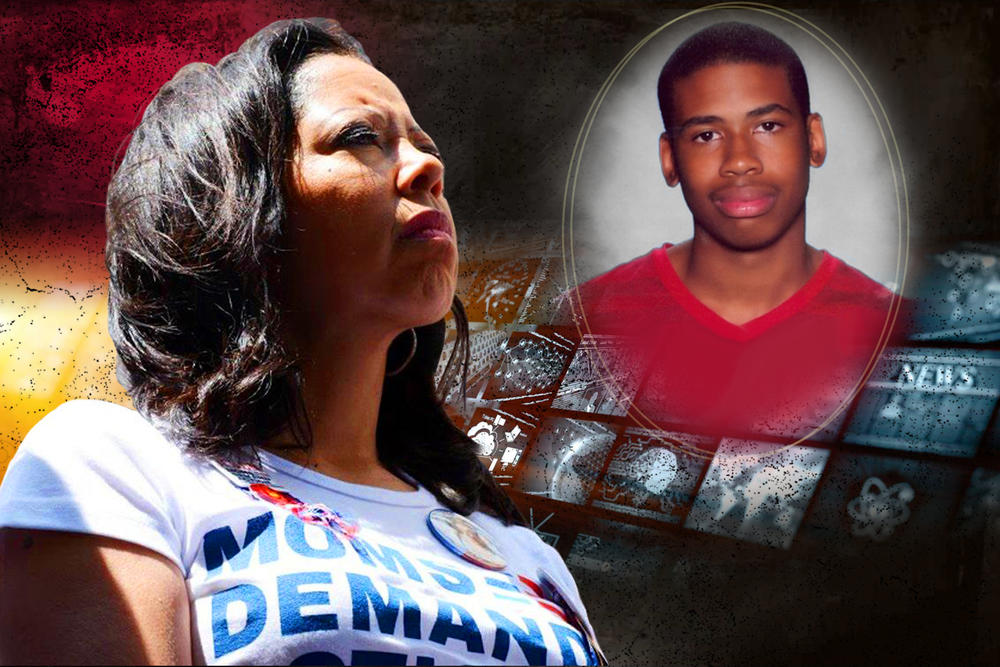Section Branding
Header Content
Slain Teen's Mother: 'No One Is Immune'
Primary Content
Georgia is no stranger to the tragedy of gun violence. On a November day in 2012, Atlanta native Jordan Davis was shot and killed at a Jacksonville, Florida gas station. The African-American teen was unarmed when a white man named Michael Dunn shot him. Dunn was reportedly angered by the music Davis and his friends were playing in their car. Michael Dunn drew a life sentence for that murder. During the trial, Dunn told the judge he may have saved someone's life by killing Jordan Davis.
"Maybe, maybe he would killed somebody if it hadn’t been for me," Dunn said then.
Celeste Headlee spoke to Jordan Davis' mom in 2015. She started the conversation by asking Lucia McBath what it was like to hear Michael Dunn say that about murdering her son.
Lucia McBath talks about the death of her son.
Transcript
Lucia McBath: I mean, very early on we knew that a lot of what we were dealing with was racism but we kept that quiet. We didn't feel the need to point that finger and so-called play the race card at that moment even though we knew that Michael Dunn was racist, and pretty much could not have done what he did not unless he had those feelings. But to actually hear it on audio and to actually see it written in the letters the jailhouse letters was just it was horrible.
It was horrible because it was all spelled out for us here. You know our boy and the boys had come in contact with somebody that had such horrible thoughts and ideas about you know people of color and young black men. And I think it was just really so troublesome to us because we know that there were a lot of Michael Dunn's walking around in the country. Who don't think that they're racist and that's so disheartening because you know, we say how far we've come in this in this country and we're supposed to be a post-racial society. But it appears to us as we see what's happening in the country most recently you know there is a resurgence again of racism. And the thing that I find is that it's been there all along. This undercurrent of this kind of racism that we see now has been here all along.
Celeste Headlee: Lucia, let's hope that no other parent has to go through what you have gone through to kind of understand some of the issues of the day. I mean everybody talks in debates about stand your ground everyone talks and debates about gun control, and talks and debates about racism. But when none of us ever think we're going to lose our kid to these philosophical ideas. So, what would you say is sort of the message of your son's death?
Lucia McBath: What do you say to other parents who may still feel very disconnected from these topics? I say to them is that I believe that what we're seeing in the country right now is kind of of of an awakening of the larger problems that we're dealing with conflicts.
And I think the crises that we see with you know, all the young men that are dying in the country and then you know the children at Sandy Hook and all of these that we could list, all these kinds of shootings are happening, and I think it's just systemic of something that's even bigger and broader in the country that has to be dealt with. And so what I try to say to those parents that you know many of them a lot of them you know their cases they're never in the public. A lot of them have never received any justice for the murder of their loved ones. And what I try to say to them is that I think this is an awakening in the country that is going to cause us as a nation us individually collectively to look at just who we are and what we think about our fellow man. How much value do you place on the lives of people that don't look think or act like you? And how much value do you place on communities that are outside your own focus and realm? And if you have not committed yourself to thinking about others and the plight of others in this country then basically, shame on you.
Shame on you, because if you believe that what is happening in the country cannot or will not happen to you you are sorely misguided, because the violence has gone way beyond the ghetto and way beyond the urban area. And so, now no one is immune to these kinds of conflicts and opinions and issues that we're dealing with.



